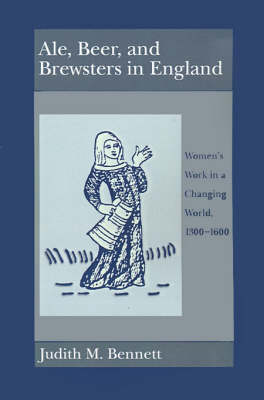
Ale, Beer and Brewsters in England
Women's Work in a Changing World, 1300-1600
Seiten
1997
Oxford University Press Inc (Verlag)
978-0-19-507390-4 (ISBN)
Oxford University Press Inc (Verlag)
978-0-19-507390-4 (ISBN)
In 1300, women brewed and sold most of the ale drunk in England, but by 1600 the industry was largely controlled by men. This work asks how, when, and why brewing ceased to be a woman's trade. In doing so, it sheds light on the effects of early capitalism on the status of women's work.
Women brewed and sold most of the ale drunk in medieval England, but after 1350, men slowly took over the trade. By 1600, most brewers in London--as well as in many towns and villages--were male, not female.
Drawing on a wide variety of sources--such as literary and artistic materials, court records, accounts, and administrative orders--Judith Bennett vividly describes how brewsters (that is, female brewers) slowly left the trade. She tells a story of commercial growth, gild formation, changing technologies, innovative regulations, and finally, enduring ideas that linked brewsters with drunkenness and disorder.
Examining this instance of seemingly dramatic change in women's status, Bennett argues that it included significant elements of continuity. Women might not have brewed in 1600 as often as they had in 1300, but they still worked predominantly in low-status, low-skilled, and poorly remunerated tasks. Using the experiences of brewsters to rewrite the history of women's work during the rise of capitalism, Ale, Beer, and Brewsters in England offers a telling story of the endurance of patriarchy in a time of dramatic economic change.
Women brewed and sold most of the ale drunk in medieval England, but after 1350, men slowly took over the trade. By 1600, most brewers in London--as well as in many towns and villages--were male, not female.
Drawing on a wide variety of sources--such as literary and artistic materials, court records, accounts, and administrative orders--Judith Bennett vividly describes how brewsters (that is, female brewers) slowly left the trade. She tells a story of commercial growth, gild formation, changing technologies, innovative regulations, and finally, enduring ideas that linked brewsters with drunkenness and disorder.
Examining this instance of seemingly dramatic change in women's status, Bennett argues that it included significant elements of continuity. Women might not have brewed in 1600 as often as they had in 1300, but they still worked predominantly in low-status, low-skilled, and poorly remunerated tasks. Using the experiences of brewsters to rewrite the history of women's work during the rise of capitalism, Ale, Beer, and Brewsters in England offers a telling story of the endurance of patriarchy in a time of dramatic economic change.
Judith M. Bennett is Professor Emerita of History and John R. Hubbard Chair in British History Emerita at University of Southern California. She has published extensively on the history of women, particularly women in the middle ages. Her books include Women in the Medieval English Countryside (Oxford, 1987) and Sisters and Workers in the Middle Ages (co-editor, 1989).
| Erscheint lt. Verlag | 30.1.1997 |
|---|---|
| Zusatzinfo | line figures, tables |
| Verlagsort | New York |
| Sprache | englisch |
| Maße | 164 x 243 mm |
| Gewicht | 565 g |
| Themenwelt | Sachbuch/Ratgeber ► Essen / Trinken ► Getränke |
| Geschichte ► Teilgebiete der Geschichte ► Kulturgeschichte | |
| Sozialwissenschaften ► Soziologie ► Gender Studies | |
| Technik | |
| Wirtschaft ► Volkswirtschaftslehre ► Makroökonomie | |
| ISBN-10 | 0-19-507390-8 / 0195073908 |
| ISBN-13 | 978-0-19-507390-4 / 9780195073904 |
| Zustand | Neuware |
| Haben Sie eine Frage zum Produkt? |
Mehr entdecken
aus dem Bereich
aus dem Bereich
der stille Abschied vom bäuerlichen Leben in Deutschland
Buch | Hardcover (2023)
C.H.Beck (Verlag)
CHF 32,15
vom Mittelalter bis zur Gegenwart
Buch | Softcover (2024)
C.H.Beck (Verlag)
CHF 16,80
eine Geschichte der Welt in 99 Obsessionen
Buch | Hardcover (2023)
Klett-Cotta (Verlag)
CHF 34,90


